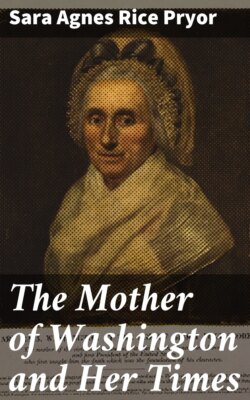Читать книгу The Mother of Washington and Her Times - Sara Agnes Rice Pryor - Страница 13
На сайте Литреса книга снята с продажи.
THE BALL FAMILY IN VIRGINIA
ОглавлениеTable of Contents
The first of the family of Ball to come to Virginia was William Ball, who settled in Lancaster County in 1650. He was the son of the attorney of Lincoln's Inn. He emigrated, with other cavaliers because of the overthrow of the royal house and the persecution of its adherents.
Before this time one John Washington, an Englishman and a loyalist, had settled in Westmoreland. He became a man of influence in the colony, rising rapidly from major to colonel, justice of Westmoreland, and member of the House of Burgesses; accepting positions under the Commonwealth, as did others of King Charles's adherents; doing their duty under the present conditions, and consoling themselves by calling everything—towns, counties, rivers, and their own sons—after the "Martyred Monarch"; and in rearing mulberry trees and silkworms to spin the coronation robe of purple for the surely coming time of the Restoration.
John Washington married three times—two Annes and one Frances—and, innocently unconscious of the tremendous importance to future historians of his every action, he neglected to place on record the date of these events. In his day a woman appeared before the public only three times—at her baptism, marriage, and death. But one of Colonel Washington's wives emerges bravely from obscurity. A bold sinner and hard swearer, having been arraigned before her husband, she was minded to improve her opportunity; and the Westmoreland record hath it that "Madam Washington said to ye prisoner, 'if you were advised by yr wife, you need not acome to this passe,' and he answered, having the courage of his convictions, '———— my wife! If it were to doe, I would do it againe.'"
And so no more of Madam Washington! This trouble had grown out of what was characterized as "ye horrid, traiterous, and rebellious practices" of a young Englishman on the James River, whose only fault lay in the unfortunate circumstance of his having been born a hundred years too soon. Bacon's cause had been just, and he was eloquent enough and young and handsome enough to draw all men's hearts to himself, but his own was stilled in death before he could right his neighbors' wrongs.
And now, the Fates that move the pieces on the chess-board of life ordained that two prophetic names should appear together to suppress the first rebellion against the English government. When the Grand Assembly cast about for loyal men and true to lay "a Levy in ye Northern Necke for ye charges in Raisinge ye forces thereof for suppressing ye late Rebellion," the lot fell on "Coll. John Washington and Coll: Wm. Ball," the latter journeying up from his home in Lancaster to meet Colonel Washington at Mr. Beale's, in Westmoreland.
Colonel Ball's Lancaster home was near the old White Chapel church, around which are clustered a large number of strong, heavy tombstones which betoken to-day "a deep regard of the living for the dead."
Almost all of them are inscribed with the name of Ball. In their old vestry books are stern records. A man was fined five thousand pounds of tobacco for profane swearing; unlucky John Clinton, for some unmentioned misdemeanor, was required four times to appear on bended knees and four times to ask pardon. As late as 1727 men were presented for drunkenness, for being absent one month from church, for swearing, for selling crawfish and posting accounts on Sunday. "And in addition to above," adds Bishop Meade, "the family of Ball was very active in promoting good things," as well as zealous in the punishment of evil. Overt acts—swearing, fishing on Sunday, absence from church—could easily be detected and punished. But how about drunkenness? There are degrees of intoxication. At what point was it punishable?
An old Book of Instructions settled the matter. "Where ye same legges which carry a Man into a house cannot bring him out againe, it is Sufficient Sign of Drunkennesse."
The descendants of William Ball held good positions in the social life of the colony. Their names appear in Bishop Meade's list of vestrymen, as founders and patrons of the Indian schools, and fourteen times in the House of Burgesses. They intermarried with the leading families in Virginia; and the Balls, in great numbers, settled the counties of Lancaster, Northumberland, Westmoreland, and Stafford. They are not quoted as eminent in the councils of the time, or as distinguished in letters. That they were good citizens is more to their credit than that they should have filled prominent official positions; for high offices have been held by men who were not loyal to their trusts, and even genius—that beacon of light in the hands of true men—has been a torch of destruction in those of the unworthy.
They, like their English ancestors, bore for their arms a lion rampant holding a ball, and for their motto Cælumque tueri, taken, as we have said, from these lines of Ovid:—
"Os homini sublime dedit, cælumque tueri
Jussit, et erectos ad sidera tollere vultus."
The rampant lion holding the ball appears on an armorial document belonging to the first emigrant. On the back of this document are the following words, written in the round, large script of those days, which, whatever it left undone, permitted no possible doubt of the meaning it meant to convey:—
"The Coat of Arms of Colonel William Ball, who came from England about the year 1650, leaving two sons—William of Millenbeck [the paternal seat] and Joseph of Epping Forest—and one daughter, Hannah, who married Daniel Fox. … Joseph's male issue is extinct."[2]
George Washington was the grandson of this Joseph Ball through his youngest daughter Mary. She was born at Epping Forest, in Lancaster, Virginia, in 1708, and "not as is persistently stated by careless writers on Nov: 30th 1706—a year before her parents were married."
